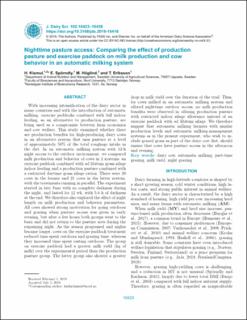| dc.contributor.author | Kismul, Haldis | |
| dc.contributor.author | Spörndly, Eva | |
| dc.contributor.author | Höglind, Mats | |
| dc.contributor.author | Eriksson, Torsten | |
| dc.date.accessioned | 2020-06-12T10:24:13Z | |
| dc.date.available | 2020-06-12T10:24:13Z | |
| dc.date.created | 2019-09-27T13:02:20Z | |
| dc.date.issued | 2019 | |
| dc.identifier.citation | Journal of Dairy Science (JDS). 2019, 102 (11), 10423-10438. | en_US |
| dc.identifier.issn | 0022-0302 | |
| dc.identifier.uri | https://hdl.handle.net/11250/2657871 | |
| dc.description.abstract | With increasing intensification of the dairy sector in many countries and with the introduction of automatic milking, exercise paddocks combined with full indoor feeding, as an alternative to production pasture, are being used as a compromise between farm economics and cow welfare. This study examined whether there are production benefits for high-producing dairy cows in an alternative system that uses pasture at a level of approximately 50% of the total roughage intake in the diet. In an automatic milking system with 12-h night access to the outdoor environment, we compared milk production and behavior of cows in 2 systems: an exercise paddock combined with ad libitum grass silage indoor feeding and a production pasture combined with a restricted daytime grass silage ration. There were 20 cows in the former and 21 cows in the latter system, with the treatments running in parallel. The experiment started in late June with no complete darkness during the night, and lasted for 12 wk, with 5.6 h of darkness at the end. We therefore also explored the effect of night length on milk production and behavior parameters. All cows showed strong motivation for going outdoors and grazing when pasture access was given in early evening, but after a few hours both groups went to the barn and did not return to the pasture area during the remaining night. As the season progressed and nights became longer, cows on the exercise paddock treatment reduced time spent outdoors and grazing time, whereas they increased time spent resting outdoors. The group on exercise paddock had a greater milk yield (kg of milk) over the experimental period than the production pasture group. The latter group also showed a greater drop in milk yield over the duration of the trial. Thus, for cows milked in an automatic milking system and offered nighttime outdoor access, no milk production benefits were observed in offering production pasture with restricted indoor silage allowance instead of an exercise paddock with ad libitum silage. We therefore suggest that automatic milking farmers with similar production levels and automatic milking-management systems as in the present experiment, who wish to in-clude grazed grass as part of the dairy cow diet, should ensure that cows have pasture access in the afternoon and evening. | en_US |
| dc.language.iso | eng | en_US |
| dc.publisher | Elsevier | |
| dc.rights | Attribution-NonCommercial-NoDerivatives 4.0 Internasjonal | * |
| dc.rights.uri | http://creativecommons.org/licenses/by-nc-nd/4.0/deed.no | * |
| dc.title | Nighttime pasture access: Comparing the effect of production pasture and exercise paddock on milk production and cow behavior in an automatic milking system | en_US |
| dc.type | Peer reviewed | en_US |
| dc.type | Journal article | en_US |
| dc.description.version | publishedVersion | en_US |
| dc.rights.holder | © 2019 The Author(s) | en_US |
| dc.subject.nsi | VDP::Landbruks- og Fiskerifag: 900::Landbruksfag: 910::Husdyravl, oppdrett, forplantning: 912 | en_US |
| dc.source.pagenumber | 10423-10438 | en_US |
| dc.source.volume | 102 | en_US |
| dc.source.journal | Journal of Dairy Science (JDS) | en_US |
| dc.source.issue | 11 | en_US |
| dc.identifier.doi | 10.3168/jds.2019-16416 | |
| dc.identifier.cristin | 1730223 | |

